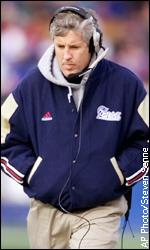| | Well, that didn't take long. Ray Rhodes, kicked down the escalator in
Green Bay for finishing 8-8. Pete Carroll, punched in the stomach in
Foxboro for doing the same thing. All within 18 hours of the season ending.
Maybe this is why Bill Parcells quit. After all, he was 8-8, too.
|  | | Pete Carroll lasted three years in New England. |
Monday, you see, is the worst day of the football season -- the day
when the owners think they know more about football than the coaches. Of
course, not one of them does -- if they did, the logic follows that they
wouldn't have hired these guys in the first place. They'd have all gotten
Bill Walshes and Joe Gibbses and Chuck Nolls to start with, right?
The swiftness with which Carroll and Rhodes were dispatched, though,
suggests that the owners are getting smarter than ever, according to the
highest-placed sources of all -- the people who shave them.
After all, if going .500 in the parity-scourged NFL is now a
treasonous offense, it doesn't take much to figure that the bar will be
raised again soon to cover anyone who doesn't actually win the Super Bowl.
On the face of it, Rhodes was fired for not being Mike Holmgren, and
Carroll was fired because his boss was delusional about the Patriots'
talent level.
But you know how innovation attracts imitation. There are more than
two dozen owners who see firings for breaking even, and at least a few of
them will start to see the benefit in firings for going 9-7, or 10-6, or
even 11-5 and not covering the spread often enough.
Finishing 8-8 would doom two playoff coaches, Dallas' Chan Gailey and
Detroit's Bobby Ross, plus Carolina's George Seifert (despite improving the
Panthers by four games), San Diego's Mike Riley (despite improving the
Chargers by three games), Baltimore's Brian Billick (despite improving the
ridiculous Ravens by two games) and Oakland's Jon Gruden (despite surviving
his 8-8 finish in 1998).
Finishing 9-7 would take out Seattle's Mike Holmgren, Miami's Jimmy
Johnson and Kansas City's Gunther Cunningham, and dissatisfying the boss by going 10-6 would eliminate Minnesota's Dennis Green and Washington's Norv Turner.
And the 11 losing coaches would have to consider themselves lucky not
to have rottweilers' teeth marks on their backsides as they fled the
compound.
Then again, there haven't been many days this season when the futures
of New Orleans' Mike Ditka, San Francisco's Steve Mariucci, New York's Jim Fassel or Cincinnati's Bruce Coslet haven't been discussed (and Coslet was ultimately punished by owner Mike Brown by keeping his job for the 2000 season).
See, we consider NFL coaches to be a sort of live game, like duck.
They're hired, we like them for a while, then they don't win right away, which makes us start to wonder when the owner will turn on them, the owners figure, "Hey, that's a great idea," and the next thing you know, you've got coaches being used as skeet.
Not that coaches necessarily deserve our sympathy. They make pretty
good money to be kicked around by the ignorant mega-rich; it's the deal
they cut when they sign on, and it's why they always seem so calm when they get smoked. They know the deal as well as anyone.
Until now, though, going 8-8 wasn't the sort of thing that got you
pink-slipped unless you (a) told the owner to blow something out of
something else, (b) sneezed on the drapes of the executive offices, (c) got
on the wrong side of the team's highest-paid player, or (d) any combination
of the above.
Indeed, only nine coaches in the '90s were fired after winning
seasons, and almost all of those dismissals came not because the coach hit
the wall but because the owner had hit the coach with the wall.
So either the NFL is getting better, there are a lot more NFL-caliber
coaches out there than we at first suspected, or the modern owner is
steeped in a lot more football knowledge than they used to be.
The first two suggestions are at least arguable. That last one,
though, is too ridiculous to even consider. Far more likely is the
supposition that the modern owner knows a lot less about football than his
predecessors, but knows that at these prices, 8-8 doesn't keep the suites
filled and the worship of his peers flowing. In other words, there are guys
who know less but think they know more, the most dangerous combination
there is.
So Ray Rhodes is gone, and so is Pete Carroll. Maybe they had it
coming, maybe they didn't. But we know this -- now that 8-8 is good enough
to lose your job over, 9-7 and 10-6 don't look nearly so good any more.
And frankly, if I were Tony Dungy, I wouldn't feel so damned giddy
either.
Ray Ratto of the San Francisco Examiner is a regular contributor to ESPN.com. | |
ALSO SEE
 Mort Report: Follow the money Mort Report: Follow the money
Parcells resigns; Belichick turns down Jets job
Carroll fired in New England
Packers fire Rhodes after just one season on job
|

 Mort Report: Follow the money
Mort Report: Follow the money